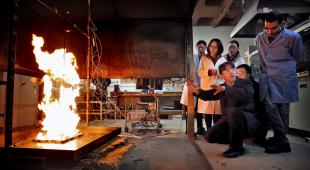The Universities of Edinburgh (UK), Ghent (Belgium) and Lund (Sweden) submitted a winning proposal for an Erasmus Mundus Masters Course in Fire Safety Engineering. The initiative was initiated by Prof. Bart Merci (Ghent University, co-ordinator), Prof. Jose Torero (formerly University of Edinburgh) and Prof. Robert Jönsson (formerly Lund University).
The curriculum concerns a two-year programme. The classes in the first semester, covering basic topics in Fire Safety Engineering (FSE), can be attended in Ghent or Edinburgh. All students spend the second semester in Lund, where emphasis lies on enclosure fire dynamics, risk analysis and human behaviour. In the third semester, classes are again taught in Ghent or Barcelona at UPC. The fourth semester is devoted to the Masters thesis, hosted by one of the four institutes, or one of our partner organisations.
Further Information
- The programme has been running successfully since 2010
- IMFSE website
- A limited number of fully funded scholarships are available.
Our MSc Fire Engineering Science is the latest degree offering in the University of Edinburgh’s long history of fire science and engineering education. The programme brings together classes from across different areas of fire safety with a strong core of fundamental fire science, an emphasis on experimental investigation, and with classes in numerical models and design applications. Students will also study the regulation of fire risks and how to protect buildings from the adverse effects of fire.
You will gain knowledge of the critical issues in fire science and fire safety engineering, an understanding of fire behaviours, and measurement techniques. You will become familiar with performance-based approaches to design and have an awareness of the capabilities – and limitations – of relevant advanced modelling methods for fire safety engineers and fire scientists.
The University first established a fire safety engineering activity in 1973. Fifty years later, new technologies and climate change are increasingly introducing fire hazards into environments that were previously considered not to be vulnerable to fire. This programme reflects the changing nature of how fire hazards impact upon human activities, and how fire science and fire safety engineering is central to addressing these challenges.



